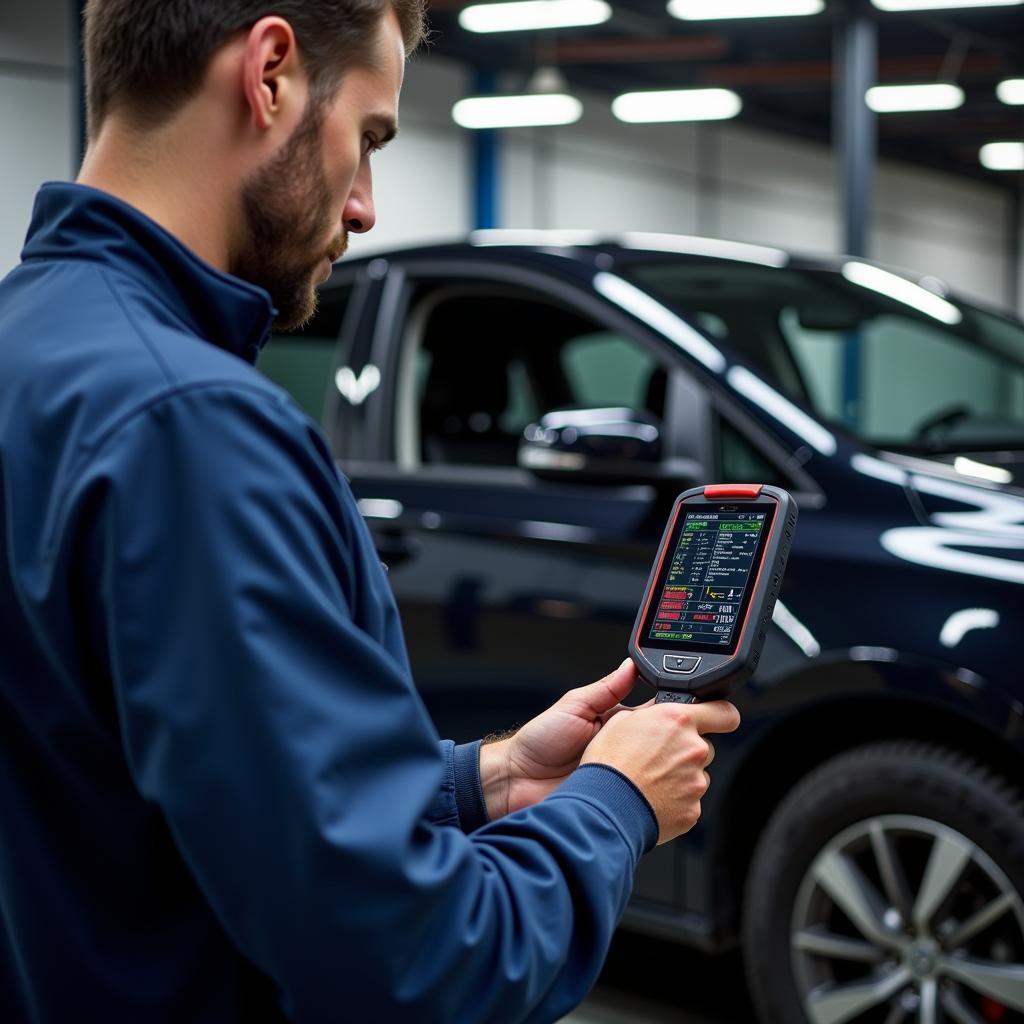Choosing the best car diagnostic scanner can feel overwhelming with the myriad of options available in 2020. Whether you’re a seasoned mechanic or a car enthusiast looking to delve into DIY repairs, having the right scanner can save you time, money, and unnecessary headaches. This guide will walk you through everything you need to know to make an informed decision, ensuring you drive away with the perfect diagnostic tool for your needs.
 Mechanic using a professional car diagnostic scanner to troubleshoot a vehicle
Mechanic using a professional car diagnostic scanner to troubleshoot a vehicle
Why You Need a Car Diagnostic Scanner
Modern vehicles are complex machines with intricate computer systems. When a warning light illuminates your dashboard, it indicates a problem that needs addressing. A car diagnostic scanner acts as your window into the vehicle’s computer, translating those cryptic warning lights into understandable codes.
Using a scanner allows you to:
- Identify the root cause of warning lights: Instead of guessing, get precise information about the issue.
- Reset warning lights: Once you’ve addressed the problem, clear the codes and reset the warning light.
- Monitor live data: View real-time information from various sensors, such as engine temperature, RPM, and oxygen sensor readings.
- Perform special functions: Depending on the scanner model, you can access advanced features like ABS bleeding, injector coding, and more.
Types of Car Diagnostic Scanners
Before diving into specific models, let’s break down the common types of scanners:
1. Code Readers
As the name suggests, these basic scanners primarily read and clear error codes. They are affordable and user-friendly, ideal for car owners who want to understand basic engine issues.
2. OBD2 Scanners
OBD2 (On-Board Diagnostics II) scanners are a step up from code readers, offering more advanced features. They provide live data streams, freeze frame data, and access to manufacturer-specific codes. These scanners are suitable for DIYers and professional mechanics who need more in-depth information.
3. Professional-Grade Scanners
These high-end scanners offer the most comprehensive features, including advanced programming, bi-directional controls, and extensive diagnostic capabilities. They are generally used by dealerships and professional mechanics due to their advanced functionality and higher price point.
Choosing the Right Scanner for Your Needs
Selecting the best car diagnostic tool 2020 depends on your individual requirements:
For Casual Users:
- Code Reader: If you primarily want to read and clear basic engine codes, a code reader is a cost-effective choice.
- Entry-Level OBD2 Scanner: If you want to access live data and perform some basic functions, an entry-level OBD2 scanner is a good option.
For DIY Enthusiasts and Mechanics:
- Mid-Range OBD2 Scanner: Look for scanners with a wide range of features, including manufacturer-specific codes, live data graphing, and some special functions.
For Professional Mechanics:
- Professional-Grade Scanner: Invest in a high-end scanner with advanced programming, bi-directional controls, and extensive diagnostic capabilities.
Key Features to Consider
When evaluating car diagnostic scanners, pay attention to these essential features:
- Vehicle Coverage: Ensure the scanner supports your vehicle’s make, model, and year. Some scanners are specialized for specific brands, while others offer wider coverage.
- Code Reading and Clearing: Verify that the scanner can read and clear both generic and manufacturer-specific codes.
- Live Data: Live data streaming lets you monitor sensor readings in real-time, aiding in diagnosis.
- Special Functions: Depending on your needs, consider scanners that offer functions like ABS bleeding, injector coding, or key programming.
- User Interface: Opt for a scanner with a user-friendly interface, clear navigation, and an easy-to-read display.
- Durability and Portability: Choose a scanner that is built to last and portable enough for convenient use.
Top Considerations for 2020
In 2020, the trend is shifting towards smarter, more connected diagnostic tools. Keep an eye out for scanners with:
- Wireless Connectivity: Bluetooth or WiFi-enabled scanners offer greater flexibility and allow for wireless data transfer.
- Mobile App Integration: Some scanners come with companion mobile apps that provide a more intuitive interface, expanded functionality, and data logging capabilities.
- Cloud Storage: Cloud-connected scanners allow you to save and access diagnostic data from anywhere, making it easier to track repairs and share information.
Conclusion
Finding the Best Car Diagnostic Scanner 2020 doesn’t have to be daunting. By understanding the different types of scanners, considering your specific needs, and prioritizing essential features, you can make an informed decision that empowers you to take control of your vehicle’s health. Remember, having the right diagnostic tool can save you time, money, and frustration in the long run, keeping you on the road and in the driver’s seat.

Leave a Reply